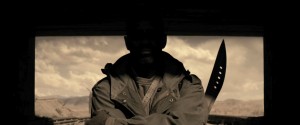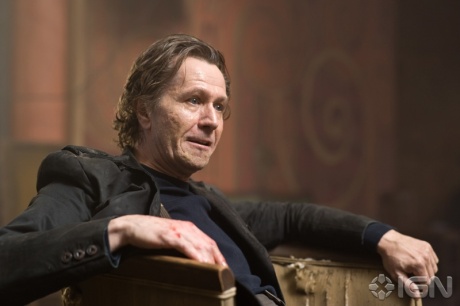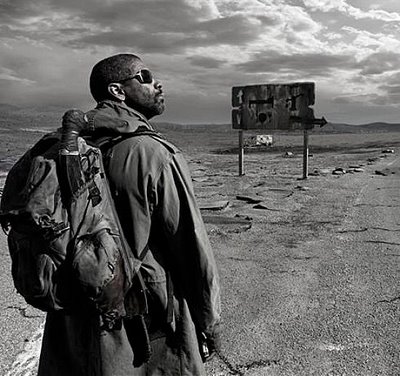In our opening post on The Book of Eli (click here), I promised to carve out 3 points the film makes about man, religious power, and God, so let’s continue:
1. The heat of life brings people’s true nature to the surface. ..
..
“When the chips are down, these ‘civilized’ people will eat each other. You’ll see. I’ll show you.” The Joker’s jeering claim about human nature in 2009’s The Dark Knight proves true in The Book of Eli. Civil and insulated as we can be in western culture, it’s easy to make claims about humankind getting “better” when it may be, in fact, we simply aren’t desperate or tested enough to expose our wicked hearts. Cannibalism, murder, and rape run rampant in this fictional future; there are no Good Samaritans.
Romans 3:10 says “it is written: “None is righteous, no, not one”. We often THINK we know those around us, we often think we know ourselves, sitting in easy judgment of those we read about in preceding cultures or third world situations. The reality is – to use a foliage analogy – the “heat” of life beating down on our heads exposes what kind of plant we are… whether we produce “fruit” or “thorns”. Eli’s world is fraught with human thorns, and the judgment on human nature is bleak… but our protagonist is carrying a seed that might change things…
2. Some people desire religion for control of themselves and others…
 Some men are worse than those killing and maiming others to sustain themselves. They hunger for power, and they’ll twist and bend the truth to serve their purposes. Carnegie (played with feverish delight by ever-changing Gary Oldman) remembers the “power of the Word” from when he was a boy. Instead of looking to the good book as a source of hope, he remembers the authority it commanded and craves it, to keep his pawns in place and ascend a ladder of leadership in this devastated world.
Some men are worse than those killing and maiming others to sustain themselves. They hunger for power, and they’ll twist and bend the truth to serve their purposes. Carnegie (played with feverish delight by ever-changing Gary Oldman) remembers the “power of the Word” from when he was a boy. Instead of looking to the good book as a source of hope, he remembers the authority it commanded and craves it, to keep his pawns in place and ascend a ladder of leadership in this devastated world.
He has no care about God, he wants to BE god. His comments and attitude, ultimately about how scripture can be abused, are worth the price of admission. When he reacts to a girl who has been taught how to pray, it’s priceless.
“There are some things in them that are hard to understand, which the ignorant and unstable twist to their own destruction, as they do the other Scriptures.” – 2 Peter 3:16
3. …but Eli is convinced that he serves a REAL God who is active, seeking followers and relationship.
 Perhaps the most controversial part of the film is not a seeming pro-scripture stance, but Eli’s insistence that there is more than a mere book that governs and guides for life and sustenance. Although none of the other characters actually hear God’s voice, Eli remains unwavering in his belief, his mission, and his morals.
Perhaps the most controversial part of the film is not a seeming pro-scripture stance, but Eli’s insistence that there is more than a mere book that governs and guides for life and sustenance. Although none of the other characters actually hear God’s voice, Eli remains unwavering in his belief, his mission, and his morals.
As this unlikely hero continues to evade bullets and life-threatening situations – something we’re used to in movies that posit offer NO plausible reason for their fortune – the film plays on this heroic stance with a new, mounting possibility for why this gifted-but-still-human character cheats death again and again. What if it truly is the will of God? The culmination of events in the film certainly offers viewers something to keep them talking after the credits roll.
I also can’t help noting 3 favorite slices of the film:
-
The introduction of Eli, revealing his prowess in silhouette under the overpass, is pure gold.
-
Books Carnegie discards in disgust include The DaVinci Code and an Oprah “O” magazine. He’s evil, but not dumb.
-
Eli quotes Psalm 23 and Solara (Mila Kunis) remarks “That’s beautiful. Did you write that?”
And of course, there’s the ENDING… but I won’t put a spoiler in this post. What was YOUR favorite scene?
The Hughes Brothers haven’t directed a film since From Hell, and I believe they delivered unquestionably. As a haggard Denzel Washington strides along a broken overpass, looking for all the world like he’s a first-person shooter in Fallout 3, dwarfed by the washed out landscape of a future where the Bible is all but gone and prayers have been forgotten, you realize these guys have made a “January release” truly feel epic. If winter is the wasteland for movies, Eli stands tall and accomplishes his task amidst the wreckage.
In a final post (for those who’ve seen the film, as there will be SPOILERS) I’ll elaborate further.
Update: audio review of The Book of Eli also available


My favorite part was how desperate she was for the Word when she saw a man truly devoted to it.
Justin MHC-BLD
Can’t wait for the third part. (First time in my life I ever prayed for a movie, that they’d leave the ending alone!)
Thanks for the review. I look forward to seeing this movie.
Question for you…
Have you ever thought about coming up with a “questions for discussion” paper for each movie you review? Something we could print out, or bring to our own movie nights? In the times when I get together with friends to watch a movie/tv show it would be great to have some wise direction for discussion after. I’d really like to redeem any watching of entertainment that I do, but we can’t all be fortunate enough to attend ‘Film & Theology night’ at Mars Hill.
My favorite scenes were toward the end, but out of the parts already reviewed, I loved the part in which Claudia tried to talk Carnegie into being more humane. Claudia is blind and named her daughter Solara, which means light.
I don’t know if there’s an intentional connection but Pontius Pilate’s wife was named Claudia. She had a dream that Jesus was innocent. This scene foreshadowed something later in the movie.
I watched the movie based on this review (and yes, it was worth the price of admission!).
My favorite scene was when Eli & Solara end up at the house (which, for those who have seen The Road, isn’t it just a bit similar/ominous to that house?) where the old couple invite them in for tea and the old woman plays Anita Ward’s “Ring My Bell” because “it’s so soothing.”
My buddy didn’t like the “tonal changes” in the film (epic to ridiculous to humorous), but I like that it didn’t take itself so seriously.
The movie also brought up a very interesting conversation about Killing and Christians, e.g. how can Eli be seen as a positive depiction of a believer when he is slaughtering people left and right? I had to point out to my friend that, as Americans, we have been taught killing is always wrong, but there was a time when God ordered His people to kill others. Now, I’m not advocating we do that again (!), but if God is the same yesterday, today, and forever, we should not be so quick to judge the conduct of believers (even in a fictional movie).
I’m looking forward to Part 3!
LOVED the scene under the bridge in silhouette. It was incredible! I really want to see this movie again, anybody know the DVD release date?
Eli is not only acting in self-defense, but in defense of something he believes God has entrusted him with and commanded him to protect. If that voice is real, it seems he would have every reason to follow the command of a sovereign God.
“Questions for discussion” paper – sounds like a GREAT idea, Maureen. I’ve been praying over ways to make what I do more of an “equipping” thing. I originally learned this from a good mentor just by observing how he correlated some examples and it “infected” me like a fictional zombie-virus. However, I know that the majority of people don’t learn that way and am trying to expand what I do to help equip and multiply what I do. Thanks for the idea! Maybe I could start adding or attaching that to reviews past, present and future.
BTW, “heat, thorns, and fruit” are ideas borrowed liberally from my friends at CCEF, specifically Paul Tripp and his book HOW PEOPLE CHANGE – if you want to understand some basics in understanding the human heart, sin, the weight of life, and how to help counsel others it’s worth a read http://www.amazon.com/How-People-Change-VantagePoint-Books/dp/0977080722
[…] 3 Deep cuts & 3 fun slices of ELI […]
My favorite scene was the morning after Solara stays with Eli. Her innocent childlike faith when she grabs her mother’s hands to pray both humbles and ignites my heart. There is such a purity as she articulates and grasps for each word of the prayer. And surprisingly even though she repeats them almost verbatim, there isn’t an ounce of religion in her voice. Her mother’s reaction is similarly beautiful. Her expressions of remembrance and longing strike the viewer as hope is sparked on the screen.
Thank you for your incredible review, James.